Photographs: Sreeram Selvaraj Shobha Warrier in Chennai
A K Padmanabhan, all India president of Centre of Indian Trade Unions was in Chennai recently, for half a day, to address CITU members. Just before catching an evening train to Kerala, he spoke to rediff in CITU's office situated in a narrow crowded street.
"This is where I used to sit for years before shifting to Delhi to take charge of the union," he said while settling down on a chair amidst files, papers and books.
In a candid interview with Shobha Warrier he shares his life's journey, his ideology, and some truths on India's labour movement.
You have been a communist for almost 50 years. What attracted you to the Left ideology?
I was born in Malabar when it was part of the Madras Presidency. I grew up in Pappinissery in Kannur district and the atmosphere over there was electric. Though I spent only 15 years there, till 1962, I grew up hearing stories of great communist leaders. Though I didn't know much about any ideology, I was influenced a great deal by the communist movement and the people fighting for justice.
How did the journey from communism to trade union movement happen?
Being the only son in the family, I had no other option but work after my 10th standard, and I came to Chennai in search of a job. I was only 15 then. I studied PUC (Pre University Course) for one year and then joined Ashok Leyland as an apprentice. As per the Apprentice Act 1961, I could work in the factory for five days a week and attend class at the ITI for one day.
The kind of atmosphere I grew up in Pappinissery, later working as an apprentice in a factory from the age of 15 and the kind of exploitation I saw in the factories brought me closer to the trade union movement.
Click on NEXT for more...
'Liberalisation of the last 20 years is against the interests of the workers'
Photographs: Reuters
Please tell us about the exploitation that you faced.
The apprenticeship was for three years. After that, you sit for the examination and the complete 2 years of specialisation. So, we worked for 5 years with a stipend of Rs 95 a month.
Though you are a trainee, except in the first 6 months, you are completely involved in production. But even after undergoing training for 3 years, you are given only the paltry stipend. After 5 years, it is understood that you will be taken as a skilled worker. In the 4th and 5th years, we were to be paid semi-skilled worker's wage but we were not. After 5 years, I was paid semi-skilled worker's wage for 2 years when I was already a skilled worker.
I was absorbed only after 7 and a half years. However, in less than a year I got dismissed for trade union activities.
What kind of trade union activities were you involved in?
There was a strike. The management was not ready either to recognise the union or accept the demands of the union. The management refused to settle the issues.
The happenings in Chennai were all new to me. Those who had lived in Chennai during 1968-75 would remember that there was a political background to the whole atmosphere. In 1967, the Congress was defeated and for the first time, a Dravidian party came to power. In fact, for the first time, the Congress lost in 8 states. There was a movement against the Congress in the whole country, there was food shortage and prices were going up.
From that time, Tamil Nadu politics has been dominated by rice! In Tamil Nadu, workers had great expectation from the DMK. I would say false expectations. The slogan of the DMK (Dravida Munnettra Kazhagam) was, they saw God in the smile of the poor people! But within a year, they started attacking the striking workers while they were expected to be their saviours. There were police firings against workers in Madras, Neyveli and Ooty.
Coming to economy, wages in Tamil Nadu, in major sectors like automobile, engineering, etc, except textiles, were lesser that what they were in Mumbai. North Chennai at that time had the biggest industrial belt with MRF, Union Carbide, EID Parry, Ashok Leyland, Carborundum Universal, Kothari Fertilisers, etc and there was English Electricals and Standard Motors also.
Ambathur was the biggest industrial estate in Asia then, the hub of automobile components. Guindy Industrial estate was the first one of its kind in India. R Venkataraman started it when he was the industry minister.
Tamil Nadu had a vibrant manufacturing industry then. Except TVS which was under the control of INTUC (Indian National Trade Union Congress), all the factories were affected at that time when workers fought for their rights.
Click on NEXT for more...
'Liberalisation of the last 20 years is against the interests of the workers'
Photographs: Sreeram Selvaraj
You said there was only one union the -- the AITUC. How did the CITU come into being?
Yes, we all worked under AITUC (All India Trade Union Congress). In 1967, the political line of AITUC was in support of the Congress. When the struggles started, AITUC leaders could not meet the aspirations and expectations of the workers, and CPI and CPM leaders started fighting with the leadership.
So, in the latter part of 1969, it was decided that we had to form a separate trade union. Discussions went on for quite some time and all of us met in Goa openly.
In May 1970, at the all India level, a trade union conference of those who believed in the left ideology was called in Calcutta. Our conference had a membership of 800,000 people. And, we decided to form a new union and that was CITU.
From Chennai, I also had the opportunity to attend the conference as a delegate.
Was the trade union affiliated to the Communist party?
No, CITU was an independent trade union body. Our ideological affiliation was with the Communist party. Similarly if you take the INTUC also, it is not part of the Congress.
Back in Chennai, what kind of union activities were you involved in?
We were involved in the struggles of the workers in all the factories. The workers were under a single union, and there were many big uprisings. For example, MRF had a strike of 118 days. EID Parry had a strike of more than 100 days. Strikes spanning more than 100 days were there in many factories.
In 1972, in Ashok Leyland also, there was a strike but it was crushed and workers were attacked brutally.
You spoke of strikes that went on for 100 days, 118 days etc. When you strike for so many days, are the workers not the ones who are badly affected? Without any wages, how do they run their families?
Yes, the most affected are the poor workers. All of us know how difficult it is to go without any money for more than 100 days. Still, if we are striking and suffering, it is a movement. That is why I call it a struggle.
As a trade union leader, would you say strikes of longer duration and of any kind, are beneficial to the workers?
Certainly, strikes are beneficial to the workers. At that time, all the strikes, except a couple, went in favour of the workers.
Click on NEXT for more...
'Liberalisation of the last 20 years is against the interests of the workers'
Photographs: Ahmad Masood/Reuters
Who gets affected by the strikes the most; the workers or the management?
You cannot quantify the sufferings. It varies on various issues. Workers lose their wages and we know we will not get paid when we strike. It is like this, I am foregoing my wages and fighting so that the management comes and settles my issue. Strikes are like a tug of war.
Still, you agree with the idea of striking and foregoing salaries?
Yes, I do. That is the only weapon, the last weapon in the hands of the workers. Strike is not a child's play. Workers know they will lose wages whether it's a token strike or a one-day strike. Even then they go on strike. Why? We don't take a decision to call for a strike without any thought. Amicable settlement is the best way to end a problem. Collective bargaining is the fundamental right of a worker. Strikes are called after plenty of deliberations, and it's our last weapon.
Do you feel a state like Kerala is adversely affected because of the frequent strikes? It has reached such a stage that nobody wants to set up a factory there.
There is no truth in this information. This image is not real. Yes, Kerala has a very large formation of unions and they are aware of their rights and they are organised. They have the collective power to bargain. That is why minimum wages is the highest there.
No industry in Kerala treats a worker like bonded labour.
But how many industries are there in Kerala?
There are many. I read that Apollo Tyres is planning to invest Rs120 crore (Rs 1.2 billion) in Kalamassery.
You talk to any industrialist in India, nobody wants to start a factory in Kerala. They are scared of strikes and lockouts.
It is not only in Kerala, here also, many say, we don't want trade unions. You must understand that existence of the factory is a must for a trade union.
A false campaign is there that trade unions are against industry. How can it be? We have been continuously saying that. But we don't want industrialisation to be used to treat the workers as if they were in the 15th or 16th century.
You cannot run a factory in Kerala without a union functioning. Every worker in Kerala knows that unless he is organised, he will be cheated. But here in Tamil Nadu or Haryana or Gujarat or Maharashtra, this feeling is comparatively less. They learn it only out of experience.
What is happening in the Ghaziabad belt? Even in Gujarat, Ford had a series of strikes. Only now you know what was happening in the Maruti plant. The CII president himself went on record and said that the situation that exists in the Maruti factory and the contract system are the reasons for the trouble in Manesar.
With paltry wages, they were using the services of contract workers. In one shift, a regular operator is paid Rs 16,000 and in the next shift, a contract worker does the same job on the same machine for Rs 6000! It is not the accusation of CITU. The fact is there everywhere.
After the incident, the company chairman said that Maruti had decided not to use contract workers from next year. What does it mean? They understand that these types of things cannot go on forever. A young worker who is under the contract of a muscle man knows that it cannot go on.
Click on NEXT for more...
'Liberalisation of the last 20 years is against the interests of the workers'
Photographs: Reuters
How much has the trade union movement changed from the socialist days to the globalised?
Irrespective of their political thinking- from the right extreme to the left extreme including SEWA (Self Employed Women's Association) - workers have started understanding that the so called liberalisation of the last 20 years is against the interests of the workers. I am saying this from experience which is there for everyone to see.
In what way has the new economic policies adversely affected the workers?
In the name of competition in the market, everything has been put on the shoulders of the workers. Maximisation of profit has become the theory and the sufferers are the workers. In the name of competition, the whole exercise is to reduce the expenses on wages. Productivity is increasing, profits are increasing, prices are also increasing but wages are coming down. In the last 20 years, real wages of workers have come down.
You mean, workers are being exploited in the name of competition?
Yes.. yes.. any money that is going out of the hands of the employer to the worker is a reduction in the profit. Any money that comes to the pocket of the worker is increase in the wages. But the real wages have gone down.
What are the unions doing about?
These days unions are fighting for this only. There are two issues here. One is the immediate economic demands and the other thing is, all the unions have understood that whatever issues we place before the government, certain policies have to be changed.
All the unions are of the opinion that the kind of privatisation that is going on in the country like divestment in the public sector, is a disastrous thing as far as the country is concerned.
When we said divestment was an attack on sovereignty, we were shouted down. Now, take the case of Coal India. Recently, they received a notice from a hedge fund that operates from Australia, that has just 1% investment in Coal India. Remember Government of India still has 90% share. The notice is that the Government of India is interfering in the efforts of Coal India and directing the management to sell it below the market price.
Click on NEXT for more...
'Liberalisation of the last 20 years is against the interests of the workers'
Photographs: Sreeram Selvaraj
Do you feel MNCs come here to exploit the workers?
Yes. Let me make it clear we are not against the MNCs here but it should be in those areas where it is necessary and help the country technologically. But there should be fairness in dealing with the workers, the same way they respect their workers in their own country.
You spoke of the ill effects of divestment. When a series of train accidents happened, many said at least partial privatisation is the only answer to proper maintenance. What do you say about this?
Wherever private participation has happened in the name of public private participation (PPP), has not worked in favour of the people at all. The experience of PPP at least in the infrastructure related areas has not been good.
What is the experience of privatisation of the British Railways? The government handed over the railway tracks to one company, signalling to another company, wagons to a third and the British Railways, one of the best in the world, was demolished overnight.
In our lifetime, we have been hearing about technological advancement and has anything been implemented in the Indian Railways? All these are remembered and talked about only when there is an accident. After 48 hours, everything is forgotten. So, privatisation is not the answer to efficiently running and maintaining the Railways.
In the coming years, will the individualistic, capitalist model followed by the west prevail, or will there be a revival of the left ideologies like it is happening in some of the European countries?
The answer lies in what is happening in the so called developed world. Now, the Americans have the slogan, 1% vs 99%. That is the fact. The capitalist system is doomed because it is against natural justice.
In India also, when poverty in the country is increasing, the number of rich and the disparity also is increasing. How long can you go on like this?
The existing system where the majority is ignored and the minority is favoured, will be challenged. This struggle will happen all over the world.
In the last 3 years, we saw changes in 10 governments out of 17 in the Euro Zone. The whole change was under one slogan, "no" to austerity. Under the name of austerity, wages are reduced and workers are the worst sufferers.
Do you see a system that can work better?
The only system that will work is scientific socialism where there will be minimum contradictions, and where interests of the majority are taken care of.

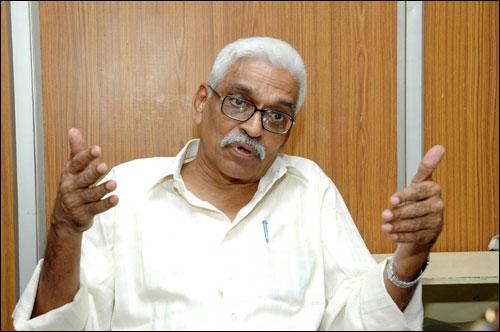
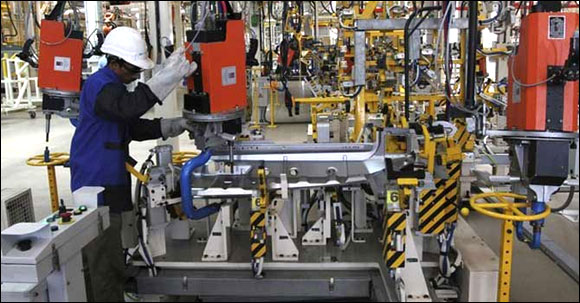
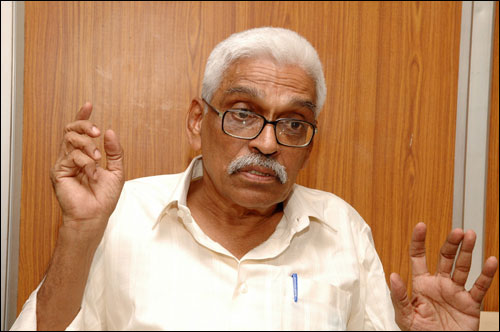
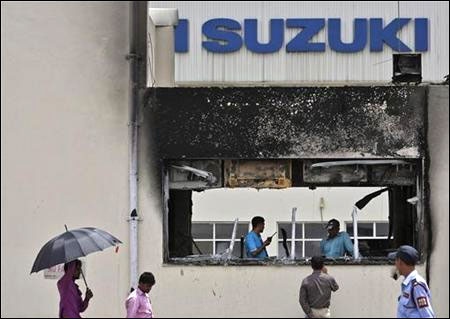
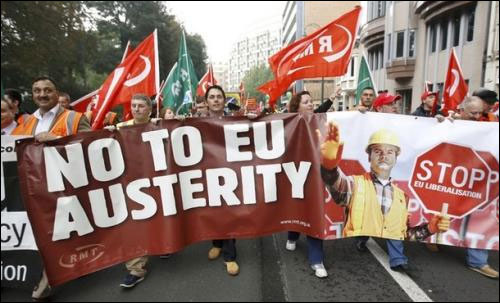
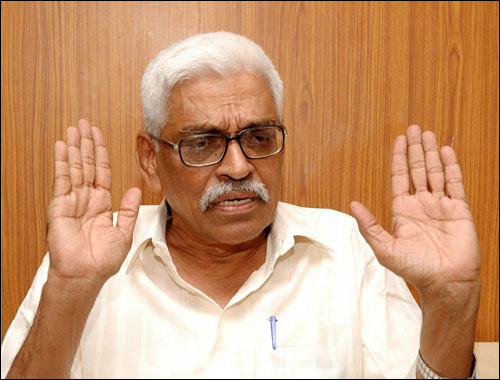
article